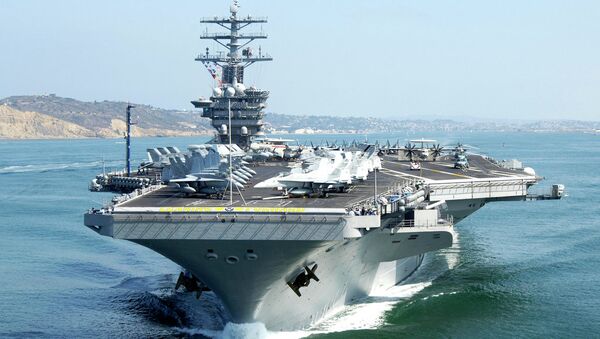Politico reported Monday that US President Donald Trump overruled acting Defense Secretary Christopher Miller on Sunday when he ordered the USS Nimitz, a supercarrier of the US Navy, to remain in the Persian Gulf, despite previously being instructed to return home to Naval Station Everett in Washington amid heightened tensions with Iran.
"Due to the recent threats issued by Iranian leaders against President Trump and other U.S. government officials, I have ordered the USS Nimitz to halt its routine redeployment," Miller said in a statement released January 1. "The USS Nimitz will now remain on station in the U.S. Central Command area of operations. No one should doubt the resolve of the United States of America."
The move came shortly after Ebrahim Raisi, Iran’s judiciary chief, announced that Soleimani's murderers would be brought to justice. The Iranian general was killed near Baghdad International Airport on January 3, 2020, during an airstrike authorized by Trump.
Raisi noted that one should not assume Trump, "who appeared as a murderer or ordered a murder, may be immune from justice being carried out."
Satellite imagery recently released by US-based company Planet Labs showed what appeared to be so-called "cluster" activity by IRGC vessels in the Strait of Hormuz.
In the Strait of Hormuz, the satellite via @planetlabs is suspected to capture the "cluster" activity of the Iranian Revolutionary Guard's water ships#OSINT #IRGC #PersianGulf pic.twitter.com/TcKfsAAc4D
— liuming (@lobsterlarryliu) January 3, 2021
Two former Mossad chiefs and a former national security council chief recently spoke with The Jerusalem Post and argued that any action taken by Tehran to avenge Solemani would likely not occur until after the inauguration of US President-elect Joe Biden on January 20.
Shabtai Shavit, a former Mossad director, highlighted that the November assassination of top nuclear scientist Mohsen Fakrhizadeh was "a double blow against Iran's military activity in the Middle East."
He also went on to suggest that Esmail Ghaani, the current commander of the Quds Force, is not on par with Soleimani in terms of leadership.
"Some say they are not useful because one goes and the next one comes into line and replaces him… the level of talent of the one who entered his [Soleimani's] shoes disproves that argument," Shavit argued, stressing the importance of bracing for a possible retaliatory attack.
"We must take into account that they will respond. They will wait for an opportunity to attack a high-quality target."
Soleimani was killed in a drone attack ordered by President Donald Trump himself on 3 January 2020. The Trump administration claimed they had evidence of Soleimani planning attacks against American embassies in the region, but failed to provide any to the public.
Several days later, Iran retaliated by carrying out airstrikes against two Iraqi military bases that hosted US troops. The attack resulted in no deaths, but brought minor injuries to several American servicemen.
However, in November, Hossein Dehghan, Iran’s former defence minister-turned adviser to Supreme Leader Ayatollah Ali Khamenei, called the January missile attack only an “initial slap” of revenge.


